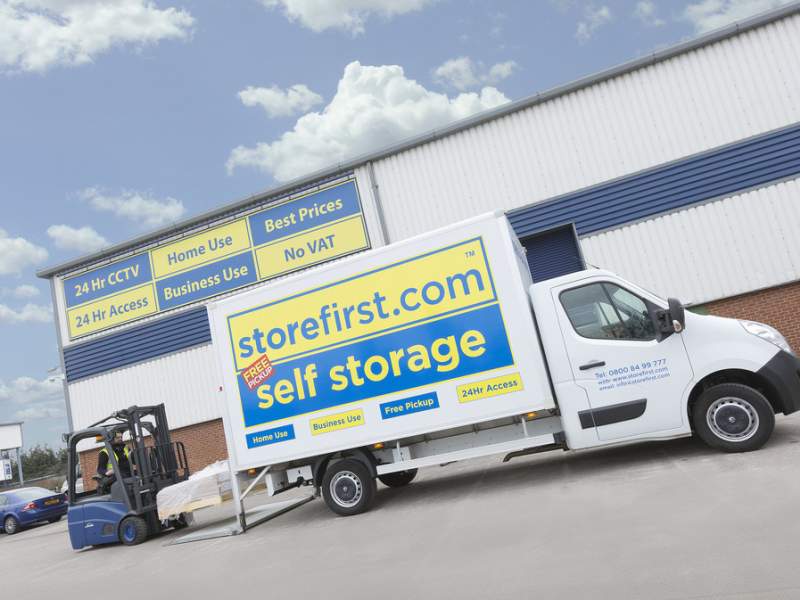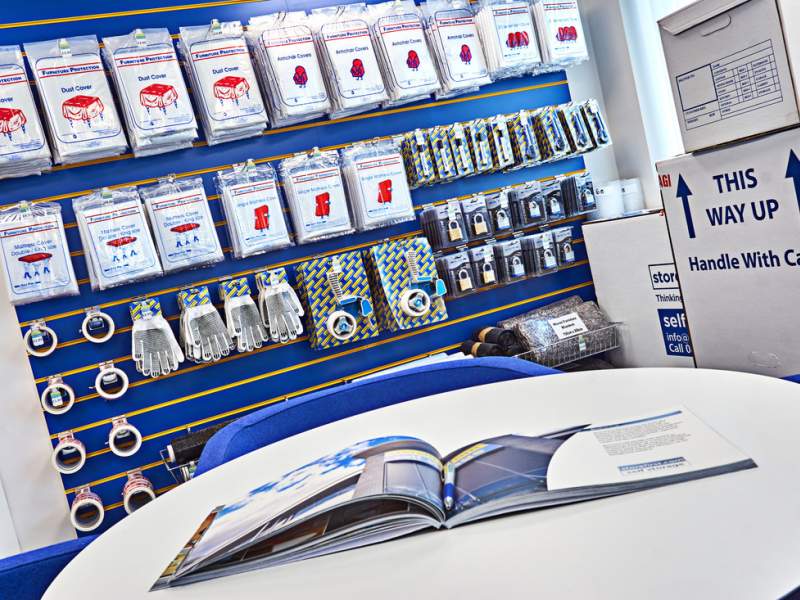Small businesses run from Self-Storage units

The corrugated iron corridors of the Access self-storage centre in West Norwood, south London are marked by the anonymous outlines of padlocked doors.
Behind many are the belongings that people just can't bring themselves to throw away - often the residue of life-changing moments like death or divorce.
Yet in among the stacks of furniture and knick-knacks, a growing number of the metal containers play host to a wide range of small businesses.
They're attracted by the flexibility, the short-notice periods and low overheads that characterise the rough and ready space offered by the self-storage industry.
Hiren Patel, the boss of e-commerce gift company Sent 4 U, runs one such small firm, and he's exhausted.
In the run-up to Christmas his team is parcelling up 12,000 items a day - toys, party goods, diaries, cards and his best-selling Santa outfits - and sending them all around the world.
It's a round-the-clock operation, and he employs 20 staff to help him keep up with the festive rush. For a seasonal business such as his, the self-storage units are ideal.
"It's convenient to be here," he says."You don't need to pay council tax, it's all included in the rent."It gives you choice, if the business isn't performing you can give one month's notice and move on, or you can reduce your space so it gives you nice flexibility."

Mr Patel uses different storage units for different bits of his operation - like a series of mini warehouses.
"It is a kind of depot," he says. "We keep our distribution centre here to use the flexible space and save some money."
Easy to expand
While the High Street is suffering from a rise in empty shops, the market for storage units is growing as more online retailers realise they are convenient and cheap places to store their stock.
Storage centres are typically located on the outskirts of towns, in areas where space is cheap. And while these locations might not provide a prestigious address, the basic units are ideal for e-commerce firms.
In Balham, south west London, Helen Cockle and Helen Gilbert moved their children's clothes business, the Little Legs Company, to a local Big Yellow storage centre when their stock outgrew the kitchen table.
Starting off with a 15 sq ft (1.4 sq m) storage space in a local Big Yellow centre, three years later the company has expanded into a space almost 10 times the size.

Many storage centres also provide a front-of-house reception area to take deliveries. Mike McGuire from Scottish self-storage company Len Lothian says such a service is a major attraction for small businesses who rent its units.
"The main reason why small firms especially store with us is that we accept deliveries on their behalf," says Mr McGuire. "We sign for and take in the goods into store. They are out and about running their business and don't waste time awaiting delivery of stock."
No business rates
Storage companies started in the US in the 1970s, the concept then spread to Australia, and only really launched in the UK in the past 20 years.
It's in this past decade that renting space has started to boom, and there are now about 1,000 sites in the UK providing more than 30 million sq ft of storage space.

Rennie Schafer, chief executive of Self Storage Association UK, says: "For businesses it's a flexible way they can store their goods and their materials.
"And they only pay for the storage they need rather than a warehouse which could be half full one day and overflowing the next."
More and more storage companies are recognising this, and targeting business customers. This year, 42% of self-storage space was for commercial use, compared with 39% in 2012.
And while the Treasury introduced VAT on storage space in 2012, which has pushed up prices for domestic users, businesses can claim it back.
Firms also do not have to pay business rates - the taxes usually paid on non-domestic properties - on any storage space they use.
This is because the Valuation Office Agency says the burden falls on the self-storage company itself. "We normally assess self-storage facilities as a warehouse and the operator of the self-storage facility will generally be liable for the payment of rates," it says.
It's hard to put an average price on the cost of storage space in the UK because it differs across the country, but a customer can expect to pay about £20 a year per sq ft.

Ollie Saunders, head of self-storage at accountancy group Deloitte, says: "Today, in some stores, every other unit is a commercial customer.
"Businesses no longer need to rent a dodgy lock-up garage down a side alley - instead they use a self-storage facility where they also can get a cappuccino in reception."
Back in West Norwood, the Sent 4 U team is just focusing on processing their orders.
Jugal Goswami, a manager, says: "Christmas time is the perfect time for us.
"But I don't think it's going to slow down, Valentine's Day is coming, Mother's Day is coming, Father's Day is coming - so we might get more space, but we're not going to take less."
Source - http://www.bbc.co.uk/news/business-25336446
For more details, email info@storefirst.com





























































































































































































































